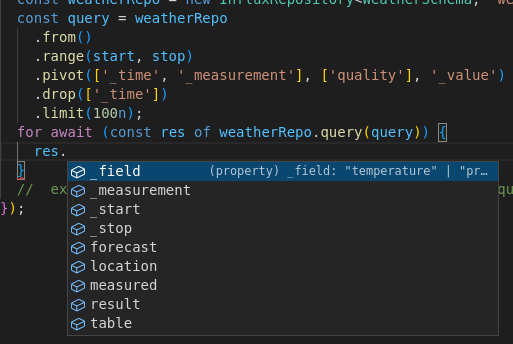@mpauly/flux-query-builder
v0.1.4
Published
A typescript query builder for the [flux language](https://www.influxdata.com/products/flux/). The query builder features **extensive typing** and **short hands for common operations**.
Downloads
6
Readme
flux-query-builder
A typescript query builder for the flux language. The query builder features extensive typing and short hands for common operations.
As a simple example the call
const query = from('example-bucket')
.range('-1h')
.filter({ _measurement: { $in: ['m1', 'm2'] }, _field: { $in: ['field1', 'field2'] } })
.group()
.pivot(['_time'], ['_field'], '_value')
.map({ _value: fluxExpression('r.field1 / r.field2 * 100.0') });yields the following flux query
from(bucket: "example-bucket")
|> range(start: duration(v: "-1h"))
|> filter(fn: (r) => contains(value: r["_measurement"], set: ["m1", "m2"]) and contains(value: r["_field"], set: ["field1", "field2"]))
|> group()
|> pivot(rowKey: ["_time"], columnKey: ["_field"], valueColumn: "_value")
|> map(fn: (r) => ({r with _value: r.field1 / r.field2 * 100.0}))So you don't have to remember the details of the map or filter syntax, instead have strong type support in writing a query, but do not lose the power of the flux query language.
In addition, you can provide type information to the query builder. A query such as
// this interface defines the available fields and tags
interface WeatherSchema {
fields: { temperature: number; precipitation: number };
tags: { quality: ['measured', 'forecast']; location: ['zurich', 'berlin'] };
}
const weatherRepo = new InfluxRepository<WeatherSchema, 'weather'>(db, org, bucket, 'weather');
const query = weatherRepo
.from()
.range(start, stop)
// pivot and drop modify the return type correctly
.pivot(['_time', '_measurement'], ['quality'], '_value')
.drop(['_time'])
.limit(100n);then leads to an object with correct typing, see the screenshot below.

Status
The query builder is actively being developed. At the moment it only supports a selection of functions from the flux query language. If you are missing a function, you are more than welcome to open a PR. Adding new functions in most cases should be straightforward.
Additionally, the rawFlux() function allows you to execute raw flux queries, should your use-case not be supported by the query builder yet.
Usage
For some examples of how to build queries see the tests. In principle there are two ways to use the query builder: Either you can use the query builder without type hints by directly calling the from(bucket) function. Or you can instantiate a repository with the InfluxRepository constructor and appropriate type hints and then use its from() method to also obtain type hints.
A more detailed documentation will follow at some later point.
